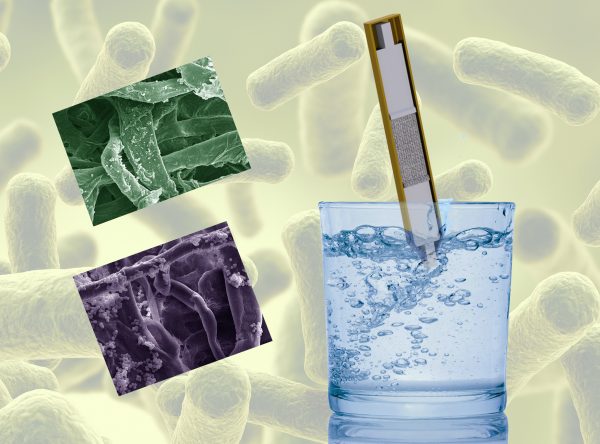TORONTO, November 14, 2016 – Paper strips laced with sugar could be the sweetest solution so far, literally, to kill E. coli in contaminated water. York University researcher Sushanta Mitra says the “DipTreat” discovery will be key to developing a new generation of inexpensive and portable water treatment devices, with human health benefits in Canada and around the world.
 DipTreat is the latest innovation by researchers at York’s Lassonde School’s Micro and Nano-scale Transport (MNT) Lab. The group has previously discovered new ways to detect E. coli in contaminated water using a Mobile Water Kit.
DipTreat is the latest innovation by researchers at York’s Lassonde School’s Micro and Nano-scale Transport (MNT) Lab. The group has previously discovered new ways to detect E. coli in contaminated water using a Mobile Water Kit.
“Now with DipTreat, we have learned it will take less than two hours to fish, trap and kill E. coli in water,” says Professor Mitra in the Lassonde School of Engineering, who heads up the lab. “We were able to efficiently remove almost 90 per cent of bacteria by dipping the special paper strip, DipTreat, in contaminated water samples.”
While using porous paper strips to trap the bacterial cells, for killing, the researchers used an antimicrobial agent extracted from the seeds of moringa – commonly known as drumstick or horseradish tree. As a result, the DipTreat solution for water treatment uses only naturally available antimicrobial substances and sugar, with minimal environmental and health impact.
Currently, popular water treatment systems use silver nanoparticles and clays, whose long term impact on human health is yet to be fully understood, according Mitra. So far, DipTreat is effective for small quantities of water. For example, someone who is hiking can collect a glass of water and then dip the paper strips to purify it before drinking. Researchers believe that the invention could lead to a much greater impact.
“We expect this new approach to ‘fish’, ‘trap’, and ‘kill’ E.coli will seamlessly eliminate the harmful bacteria from water,” says Mitra, explaining the impact it could have on the national and global health scenario, from the far north of Canada to the remote villages of India, and around the world. Recognizing the global importance of water purification technology, UNICEF has invited Mitra to showcase his team’s work at a stakeholder meeting in Copenhagen on November 22.
Published as a featured article in the latest issue of the Royal Society of Chemistry journal Environmental Science Water Research & Technology, the study is co-authored by Mitra, Saumyadeb Dasgupta and Naga Siva Gunda.
York University is known for championing new ways of thinking that drive teaching and research excellence. Our students receive the education they need to create big ideas that make an impact on the world. Meaningful and sometimes unexpected careers result from cross-discipline programming, innovative course design and diverse experiential learning opportunities. York students and graduates push limits, achieve goals and find solutions to the world’s most pressing social challenges, empowered by a strong community that opens minds. York U is an internationally recognized research university – our 11 faculties and 26 research centres have partnerships with 200+ leading universities worldwide. Located in Toronto, York is the third largest university in Canada, with a strong community of 53,000 students, 7,000 faculty and administrative staff, and more than 295,000 alumni.York U's fully bilingual Glendon campus is home to Southern Ontario's Centre of Excellence for French Language and Bilingual Postsecondary Education.
Media contact:
Gloria Suhasini, Media Relations, 416 736 2100 ext. 22094, suhasini@yorku.ca
